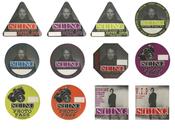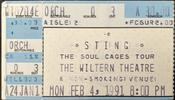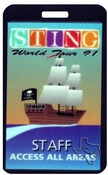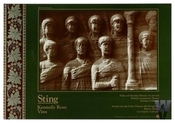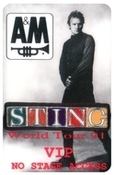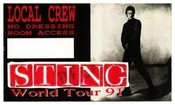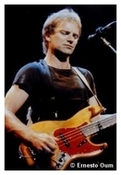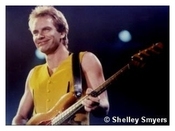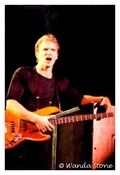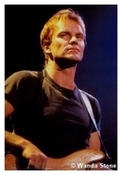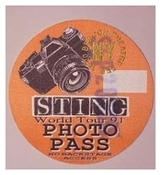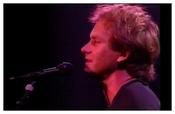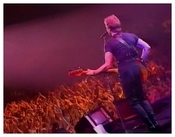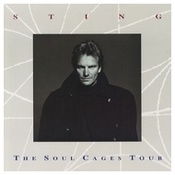
Soul Cages
Sting sprinkles surprises into concert before star-studded crowd...
Sting was not quite halfway through his sold-out concert at the Wiltern Theater Monday night when he invited the audience to shout out their musical requests.
The air was filled with a cacophony of voices screaming out old favorites by the Police, various Sting solo hits and, in one instance that caused Sting to laugh, the lounge lizard standard, 'The Shadow of Your Smile'.
But the most distinctive request was made by a woman who yelled: ''Give Vinnie a solo!''
''Vinnie'' is Vinnie Colaiuta, who rose to fame as Frank Zappa's most accomplished drummer before becoming one of Los Angeles' top studio drummers and the sometime sticksman for pop-jazz guitarist Lee Ritenour.
The woman who shouted the request was another former Colaiuta employer, Joni Mitchell, one of several luminaries in a star-studded crowd that also included Bruce Springsteen and girlfriend Patti Scialfa, actors Dennis Hopper and Wynona Ryder, and Herb Alpert (the former trumpet-playing leader of the Tijuana Brass and the co-founder of the record company for which Sting records, A&M).
For those fans within earshot of Mitchell, the 110-minute concert offered the added attraction of hearing pop's fabled Lady of the Canyon sing along in blissful, gospel-inflected harmony when Sting led the audience in call-and-response vocals on the Police's 'Message in a Bottle' and 'When the World Is Running Down, You Make the Best of What's Still Around'.
Sting also debuted a new instrumental, 'I Miss You, Kate', named for one of his daughters. Upon completing it, he confessed to the audience: ''There were two mistakes in that song, both mine, but I kept a straight face. See, I can act.''
For the most part, Sting, who performs in San Diego next month, concentrated on material from his superb new album, 'The Soul Cages', interspersed with such Police numbers as 'Tea in the Sahara' and 'Walking on the Moon'.
All told, the blond English superstar performed eight of 'The Soul Cages' nine songs with his band, which also includes ex-Bruce Springsteen/Peter Gabriel keyboardist David Sancious and ex-World Party/King Swamp guitarist Dominic Miller. The daring music they created was rich in textures and - especially in its use of jazzy harmonic and rhythmic structures - unusually subtle by pop standards.
The biggest surprises of the night came when Sting delivered a low-key cover version of Bill Withers' 1970 lament, 'Ain't No Sunshine', and a charged rendition of the Jimi Hendrix Experience's 1967 classic, 'Purple Haze', that found Sancious switching to guitar.
The concert concluded with an extended version of 'Every Breath You Take' and - in his only political statement of the evening - 'Fragile', which provided an especially moving musical commentary on the preciousness of life that seemed all the more stirring in this time of global conflict.
(c) San Diego Union-Tribune Tribune by George Varga
Sting, Vinx, Kennedy Rose at Wiltern Theatre...
It was a return to basics for A&M phenom Sting Monday night as he kicked off his world tour in a week long gig at the Wiltern for 'The Soul Cages,' already platinum and only in its second week of release. Looking elated to be back on stage and behind his bass, Sting led the SRO crowd through a pastiche of his newest work and greatest hits, the breadth of which displayed his ample mastery as a songsmith.
He started with 'All This Time,' a upbeat paean to his hometown of Newcastle, which serves as a backdrop for the new album. Cloaked in black, he played his fretless electric bass with ease, as Vinnie Colaiuta kept a tight beat on his massive drumkit. Dominic Miller played his Stratocaster with surgical precision and David Sancious played a computer linked synthesizer which gave him an array of keyboard samples to choose from.
'Mad About You' was next, a lust-power-jealousy tune in the genre of 'Every Breath You Take.' The band clicked with well rehearsed precision, and the audience, inluding rock luminaries Bruce Springsteen, Don Henley and Joni Mitchell, seemed to revel in the milkman's son's model performance. Between songs Sting sipped some 'Slippery Elm' tea as he bantered with the audience (''Good for the throat, you know'') and switched to a fretted bass. 'Jeremiah Blues (Part 1)' followed, with former E Street Band member Sancious doing an eerie solo on his electronically enhanced keyboard.
'Why Should I Cry For You?' seems destined for hit single status; though reminiscent of Toto's 'I'll Be Over You' it has it's own trademark Sting flavor. A rendition of 'Ain't No Sunshine When's She's Gone' followed, with Miller doing a powerful solo centerstage, his long hair hiding his features as he made his Strat scream. Sancious responded with a Les McCann-like jazz piano solo, his fingers attacking the keys with staccatoesque ferocity. With knees bent and eyebrows raised, Sting injected new life to this rock standard and its ''I know, I know'' chorus with the unique timbre of his bluesy voice. He seemed equally comfortable playing bass on either rock or jazz tunes but after this song, he stopped to pull his overworked fingers back into joint.
An instrumental for one of his daughters 'I Miss You Kate' followed, written during his 'writer's block' phase which accounted for a lack of lyric writing over the past three years. The album is dedicated to his late father, and reportedly it was coming to grips with the death of his parents that brought him back to the inkwell, which as evidenced by this new work, seems bottomless.
He then asked the audience for any requests, and in a frenzy they called out their favorite Sting or former band Police tunes. He finally satisfied them with 'Every Little Thing,' which brought the sold out house to their feet. During 'Consider Me Gone,' he sang with self mockery ''Spent too many years by myself, the Doctor told me it's not good for my health'' as he danced through the tune.
A menage of songs about Newcastle followed, with 'Island of Souls,' 'The Wild Wild Sea,' 'The Soul Cages,' and 'When the Angels Fall' recounting his earliest memories of the ship building hometown, the men who die on sea voyages, and the families who grieve them. He stepped from introspection to bona fide rock and roll with a thundering version of 'Purple Haze' which had Sancious doubling on Stratocaster; he played a mean solo as Sting lent his vocal flair to the Hendrix hit. Sting then led the audience through Police hits 'Message in a Bottle,' 'Tea In The Sahara,' and 'Walking On The Moon,' the latter had Sting laughing as the audience sang the chorus back to him after every verse.
He closed the set with a driving 'Every Breath You Take,' introducing the band and his own Pangaean labelists who opened the concert, Kennedy Rose and Vinx. The standing ovation brought him back for an elegant rendition of 'Fragile' with Sting playing a masterful classical guitar solo on the ecological anthem. He then shook hands with as many of the audience as he could, and with a wave was gone.
Earlier, Sting introduced Vinx, recounting how he'd discovered him one day while ducking the rain in Santa Monica's 'At My Place.' Sting went backstage and signed him on the spot for his new label Pangaea, a haven for `uncategorizable music' through I.R.S. records. Vinx opened his set with 'Tell My Feet,' playing a djembe drum between his knees as he combined the rhythms of West Africa with his strong vocal prowess, sounding like a synchopated male version of Sade. 'Temporary Love' from his 'Rooms In My Fatha's House' album featured Vinx pounding out a complex beat with his fingertips while his voice crooned in his unique Motown style. His hands were a blur of motion on the two West African drums strung around his neck, and his elegant booming voice sang the song's title over and over, sound a bit like Sting himself.
Other Pangaean labelists Kennedy Rose were also discovered and intro'd by Sting. Former back up singers for EmmyLou Harris, they brought a combination of strong guitar work and simple harmonies to their country rock sound. They opened the night with Mary Ann Kennedy playing electric mandolin and Pam Rose accompanying on an acoustic Martin. Playing songs from their 'Haiku' album, they started with their Nashville influenced 'Love Like This.' Later Kennedy played percussion as she and Rose harmonized on 'Born to Give My Love To You,' 'Prayer for the Healer' and 'Western Fires.'
(c) Variety by Rich Martini
Sting's intimate concert has little bite...
Though his music occasionally floated like a butterfly, Sting rarely stung like a bee Monday night, the opening date of his sold-out five-night stand in the relatively intimate confines of the Wiltern Theater in Los Angeles.
The concert was the first in a series of shows at smaller venues in support of his introspective new album, 'The Soul Cages'. Arena dates will follow later in the year.
This time out, the trim, high-spirited Englishman returned to playing bass guitar in a compact four-piece band. As always, Sting has surrounded himself with excellent musicians - Vinnie Colaiuta on drums, Dominic Miller on lead guitar and David Sancious on keyboards.
Sancious was easily the most valuable player of the evening, filling in much of the band's sound with a wide variety of keyboards and synthesizer effects.
The show started strongly with 'All This Time', the first single from 'The Soul Cages'. The bouncy tune was punched up considerably by Colaiuta's strong drumming and the band's overall tightness.
The obsessive 'Mad About You' followed, with Sancious providing a chugging synthesized string-section undertow that accentuated the song's darker tone.
Unfortunately, the next selection, 'Jeremiah Blues (Part 1)', began a pattern that would repeat itself throughout the two-hour show. Songs would start strongly, then quickly veer off into tedious pseudo-jazz noodlings or unimaginative guitar solos.
Sting's cover of Bill Withers' 'Ain't No Sunshine', seemingly an excellent choice, also quickly sank beneath the weight of such aimless instrumental meanderings.
To the crowd's delight, Sting sprinkled in a few favorites from his Police days. No, no 'Roxanne' or 'King of Pain'; instead, he chose 'Every Little Thing She Does Is Magic', 'Walking on the Moon', 'Message in a Bottle', and, joined by his two opening acts on vocals, a closing 'Every Breath You Take'.
Despite the crowd's enthusiasm during these and other uptempo numbers, the evening's best moments came during a quartet of somber, reflective songs from 'The Soul Cages' played in succession near the end of the show.
The songs - 'Island of Souls', 'The Wild Wild Sea', 'The Soul Cages' and 'When the Angels Fall' - were given subtle and atmospheric readings by the band, allowing Sting's high, plaintive vocals full rein; his obvious enthusiasm for the material gave the songs focus and intensity.
Immediately following this segment, as if to underscore the uneven nature of the show, he launched into an undistinguished version of Jimi Hendrix's 'Purple Haze' that sounded completely out of character and out of place.
Sting did end the concert on a high note, capping the nearly two-hour show with a tender version of 'Fragile' that packed an extra emotional wallop in this time of war: ''That nothing comes from violence and nothing ever could / For all those born beneath an angry star / Lest we forget how fragile we are.''
If only the rest of his performance could have connected as strongly.
Two acts from Sting's Pangea label opened the show. First up was the Nashville duo Kennedy Rose (Mary Ann Kennedy and Pam Rose), who sounded like a more countrified version of the Indigo Girls.
Using a mix of percussion, acoustic guitar and mandolin, and some fine two-part harmony singing, Kennedy Rose had some impressive moments, especially during the closing 'Western Fires'.
Next came Vinx, a solo performer Sting discovered at the Santa Monica club At My Place. Accompanying himself only on conga drum, he delivered three promising jazz-inflected songs as well as some delightfully funny stage patter.
(c) Daily Breeze by Sam Gnerre
Ex-Police front man floats like butterfly, Sting with new fervour...
Guest-hosting a recent episode of ''Saturday Night Live,'' Sting appeared in a sketch about a would-be hipster who can't resist the urge to nickname his co-workers. The rube accosts Sting at the office copier and launches monikers like ''Stingster,'' ''Stingo'' and ''Stingstress'' at the singer like so many Scuds.
Entering the Wiltern Theatre Monday night of Sting's five-night engagement, one couldn't help but reflect on the skit. What persona would the rock 'n' roll renaissance man assume this time? Would the performance mark the return of ''Stingster,'' the punky Police singer; ''Stingo,'' the jazzbo wanna-be; or ''Stingstress,'' the tortured poet who broods through his new album 'The Soul Cages'?
In what proved to be the concert bargain of the year, all three Stings made appearances during Monday's show. And, intriguingly enough, the schizophrenia made for a spectacular performance.
The show marked the start of a national small-venue tour, and it it's not to be missed. Women will swoon over the singer's stubbled good looks and lyrical sensitivity, and Police fans will sigh over the faithful renditions of 'Message in a Bottle', 'Every Thing Little Thing She Does Is Magic' and others radio favorites.
But the 'Soul Cages' tour is a full-blown bonanza for musicians. Sting's new, four-piece band performs with a virtuosic fury that makes his previous band seem tame by comparison.
Keyboardist David Sancious and guitarist Dominic Miller shrouded the singer's portentous tunes in eerie, ghostlike chords. Drummer Vince Colaiuta was the fulcrum upon which these haunting sounds pivoted, and his jazz- inflected rudiments anchored this remarkable band.
Most fascinating was Sting's much-improved bass playing. During his stint in the Police, the singer never dared to explore the instrument's scalar possibilities. But Sting appeared to have learned some valuable lessons in the years since. His forehead creased in concentration, he popped out funk flourishes and reached for expressive, lyrical phrases.
The quartet ably displayed its strengths during a dreamlike interpretation of Bill Withers' 1971 hit 'Ain't No Sunshine'. 'Tea in the Sahara', the sultry ballad from Police's 'Synchronicity' album, segued into a lovely rendition of the equally obscure and mystical 'Walking on the Moon'.
The band took its adventurousness too far on several occasions, like a formless suite from the new album, and a perfunctory performance of Jimi Hendrix's 'Purple Haze'. But these miscues were tolerable. Spread the news: 'Stingster'' is back and buzzing in fine form.
(c) The Daily News of Los Angeles by Bruce Bitt
Sting at the Wiltern Theatre...
Performing the first of five sold-out concerts at the ornate, 2,300-seat Wiltern Theatre February 4, Sting gave his adulatory audience two shows in one - the first very fine, the second not so hot.
The singer/bassist certainly can't be faulted for his objective: He is attempting to return what he called a ''human dimension'' to his shows with a U.S. tour of small halls. The road trek coincides with the recent release of Sting's hot-selling A&M album 'The Soul Cages'.
The first half of his set, which ran almost two hours to the minute, was a high-energy affair that eschewed splashy production values and emphasized the virtues of his crack accompanists. Sting and his gifted band (guitarist Dominic Miller of King Swamp, keyboardist David Sancious, and drummer Vinnie Colaiuta) cut an effective groove between guitar-rock and funk-inflected jazz fusion.
However, at midpoint, the show veered onto the road of high seriousness, and the ride got bumpy.
Sting, clad casually in a black vest and old jeans ripped at the knees, came out roaring with up-tempo, flexible versions of 'All This Time', 'Mad About You', and 'Jeremiah Blues (Part I)' from 'The Soul Cages'. The new album's 'Why Should I Cry For You', a cover of Bill Withers' 'Ain't No Sunshine', and 'Every Little Thing She Does Is Magic' were also among the early highlights.
But things hit a wall of inertia when the vocalist launched into a five-song suite from 'The Soul Cages'. This frankly self-indulgent, half-hour block of moodily introspective, melodically diffuse numbers stopped the show cold. Sting would be advised to take a lesson in pacing from one of his colleagues in attendance that night, Bruce Springsteen.
The set did kick back into gear in the late going with a burning cover of ''Purple Haze'' (with Sancious on second guitar) and welcome, loudly received renditions of 'Message In A Bottle' and 'Every Breath You Take'.
If Sting can refocus his set list and maintain the catapulting momentum he creates at the top of his show, his current tour of intimate halls will be a special gift for his fans. For now, though, some rethinking appears to be in order.
(c) Billboard by Chris Morris
Sting polices himself...
Which Sting will it be? The political crusader? The Broadway song-and-dance man? The brooding poet? Or the rock and roller?
The sold-out audience at the Wiltern Monday night wasn't sure which Sting would show up on this, only the third night of his first concert tour in three years.
Neither was Sting. The artist-activist, looking like the King of Pain in head-to-toe black, leather vest, torn jeans and cowboy boots, came out before his set to survey the crowd. He seemed concerned, almost worried.
That mood continued through the first half of his two-hour show as he chatted at length between numbers, trying to warm the crowd to his somber new album, 'The Soul Cages'. The audience wanted to love him, love his new band, love his new songs. But it's hard to feel ecstatic about an album devoted to death.
Sting, who had taken a three-year hiatus from music writing to act on Broadway and do other projects, said he wrote his new album as part of his personal mourning after the death of his father. ''I realized that I was going to have to write a record about death,'' he said in an interview before the release of his album, his first in three years. ''I didn't really want to.''
Playing bass again for the first time since his Police days, Sting took the stage Monday night with a stripped-down, lean-mean four-piece band; no horns or saxophones, no back-up singers, no massive percussion section. Just Sting, guitarist Dominic Miller, drummer Vinnie Colaiuta and keyboardist David Sancious, manning a fill-in-the-blanks synthesizer.
The quartet opened with perfunctory renditions of 'All This Time' (Sting sounding just like Paul Simon) and 'Mad About You', the only two songs to get much radio airplay off 'The Soul Cages'.
Sting and company then moved cautiously through the new album (including the comparatively upbeat 'Jeremiah Blues'), but not always in unison. ''That was my fault,'' apologized Sting after one instrumental interlude from 'I Miss You Kate' didn't come together. ''But I kept a straight face all the way through. You see, I can act.''
Then he smiled broadly, like a mischievous child. ''I know what you want,'' he told his audience. ''You want something you know.''
And he gave it them. The band shed its jazz pretentions and plunged into a medley of old Police songs: 'Every Little Thing She Does Is Magic', 'Bring on the Night', 'When the World is Running Down'.
Sounding very much like the old Police, Sting's new band drove home the familiar refrains. And the crowd loved it. Then, Sting rolled up his shirt sleeves and asked once again for patience as he introduced a medley of more songs from 'The Soul Cages', including the title cut.
The audience sat down and politely waited for more old stuff. After four new songs, Sting - obviously enjoying his game - teased the crowd with an unexpected 'Purple Haze', then launched into more Police: 'Message in a Bottle', 'Tea in the Sahara' and a bluesy 'Walking on the Moon', before closing with his mega-hit, 'Every Breath You Take'.
It's what the crowd wanted and what rock-and-roller Sting's new band excelled at. ''That's a lot better,'' Sting commented after one oldie.
Everybody agreed.
(c) The Long Beach Press-Telgram by Debbie Arlington
Sting strips down his act and ego for fine Wiltern show...
Was that Sting onstage at the Wiltern Theatre in Los Angeles on Monday night or was it some long-lost twin brother? Or maybe it was Stingmania - not Sting but an incredible simulation.
The Sting who played Monday, in the first of a sold-out five-night Wiltern stand, was far different from the Sting who ascended onto the stage at Inglewood's Great Western Forum three years ago.
Back then, Sting not only showed off his bare chest but his better developed ego. It was difficult to tell whether he was aching for a crown or a halo. His attitude, along with the arena acoustics, robbed his jazz-rock dabblings of the well-sculpted intimacy and complexity he was seeking on his solo albums.
However, the Sting who showed up at the Wiltern kept the wraps on his ego, political leanings, jazz pretensions and his chest. The result was a low-key but absorbing two-hour, 19-song set.
While Sting's latest album, 'The Soul Cages', is rather bloodless, it is a step in the right direction.
The singer-bassist-guitarist seems to be moving back toward pop and away from the jazz posturings of his other solo works. His decision to play small halls this time around, with a stripped-down trio of relative unknowns, also worked to his music's advantage. However, even these elements can't fully explain Sting's turnaround.
Sting casually strode onstage to introduce the opening acts - the female folk duo Kennedy Rose and percussionist/singer Vinx - both of whom record for his Pangea label. And when he came on, it was not with a sense of curtain-raising event but of a group of musicians getting together for some casual fun. Of course, Sting still being Sting, it wasn't too casual.
Even in his simple pop songs, there's rarely a note out of place, the sound mix was excellent and his backing band - guitarist Dominic Miller, keyboardist/guitarist David Sancious and drummer Vinnie Colauito - was absolutely superb.
The big surprise came in his choice of material. He performed material from 'The Soul Cages' and from his days on the Police beat with little acknowledgment of his life in between. Missing in action were 'If You Love Somebody, Set Them Free', 'Fortress Around Your Heart', 'Love Is the Seventh Wave', 'Russians' and 'We'll Be Together', his best-known songs from 'Nothing but the Sun' and 'Dream of the Blue Turtles'.
Instead, Sting got back to basics with 'Every Little Thing She Does Is Magic', 'Every Breath You Take', 'Message in a Bottle', 'When the World Is Running Down You Make the Best of What's Still Around' and cover versions of 'Purple Haze' and 'Ain't No Sunshine'.
While such a move could be viewed as pandering to the crowd's more nostalgic instincts - the Police material got the most enthusiastic reception by far - it was good to see Sting back away from his more ponderous material. Yet, if Sting has decided to play it simple, he was far from simple-minded.
The musicians were given room to play - as in Sancious' keyboard solo on 'Ain't No Sunshine' - but no one played with pretension or excess. In addition to the music, Sting displayed a welcome sense of humor. When he admitted to flubbing a couple of notes on the instrumental 'I Miss You Kate', he said he managed to keep a straight face throughout the song. ''See, I can act,'' he joked, referring to his less-than-successful film career.
Surprisingly, for someone who has made pronouncements about the disappearance of the Brazilian rain forests and the victims of Chilean death squads, Sting made no comments about the current political situation. The only reference came in the lyrics to 'Fragile' - a song about the difficulties of politics - in which his line ''nothing comes from violence'' was received with a raucous cheer.
When he left the stage with a simple wave, Sting seemed downright humble. Sting? Humble? Nah, couldn't have been.
(c) The Orange County Register by Cary Darling
Sting's soulful surprises...
If Gordon Sumner wants to temporarily shelve the name Sting for another word beginning with ''S'', the one he might adopt for his new world tour is Surprise.
That element was the British rock singer-songwriter's frequent companion Monday night at the Wiltern Theatre, where he and a three-piece band put on a warm, brilliantly designed two-hour concert that was even more satisfying on balance, than Paul Simon's recent, triumphant series of shows.
There was a seductive, unpredictable quality to both Sting's manner and music as he balanced entertainment and art in a way that perhaps inadvertently, challenged the charges of ''distant'' and ''pretentious'' that have been often levelled at him over the years by detractors.
Remarkably, Sting accomplished this on a tour that centres on music from his new The 'Soul Cages' album, a sombre, hugely ambitious work built around coming to grips with the 1987 death of his father. That's not exactly your standard pop party fare and it's a potential land mine for anyone prone to take himself and his art too seriously.
So, the first surprise Monday was Sting's manner. Dressed fashionably downscale with black vest, black shirt and black pants torn at both knees (one point for the detractors), he came out at the start of the show to introduce both support acts, the country-flavoured Kennedy Rose duo and jazz-accented singer- percussionist Vinx (one point for Sting). It was a gracious gesture designed to help assure the acts of more attention than they would otherwise have received on a night when the audience was so primed for the headliner.
When Sting returned with the band, he was in a relaxed, playful mood - asking for requests at one point even though he knew that all the voices would drown each other out in the subsequent shouting. He also took a good-natured jab at himself, referring indirectly to the battering he took from reviewers in 1989 when he starred in 'Threepenny Opera' on Broadway.
Noting the tour, which began last week in Berkeley, was still in the shakedown stage, he pointed out after an instrumental number that there had been two mistakes in the playing - both his. ''But you probably didn't even notice because I kept a straight face,'' he offered. ''So you see I can act.''
The more important surprises of the evening, however, centred on his music. Given the seriousness of the album and its early public reception (more than 1 million copies sold in just two weeks), it made sense to play the album in its entirety at the start of the show.
Instead, he opened with 'All This Time', which is the current single from the album. A hit on both mainstream rock and alternative/college rock radio formats, the song has a lilting melody but its theme about religious rites, death and life's purpose gives it an angry, bittersweet edge.
He followed with three other songs from the album, the obsessive 'Mad About You', the satirical 'Jeremiah Blues' and, most significantly, 'Why Should I Cry for You?'
The latter is a delicate yet eloquent look at the questions and confusion of a son who never had a good relationship with his father and suddenly finds himself, through his father's death, unable ever to correct the situation. Sample lyrics:
Why should I cry for you?
Why would you want me to?
And what would it mean to say
That I loved you in my fashion?
He followed his own composition - surprise - with a version of Bill Withers' 'Ain't No Sunshine', and the even more surprising thing was that the rendition worked well. 'Ain't No Sunshine' has been recorded no doubt hundreds of times since Withers wrote it in the early '70s but the interpretations have usually been either woefully understated or annoying melodramatic. Sting's was tenderly soulful, serving as a gentle acknowledgement of the healing power of music.
With the evening's first artistic and emotional point established, the band then entertained the audience with some oldies, including 'Every Little Thing She Does Is Magic' from Sting's Police days and 'Consider Me Gone' from an earlier solo album.
By this time, it was an hour into the concert and it appeared that Sting, who played bass, was going to concentrate on reinterpreting some of his older material with his new band, which consists of keyboardist David Sancious, guitarist Dominic Miller and drummer Vinnie Colauita. The trio doesn't offer the intoxicating rhythmic textures of the more jazz-flavoured lineups that accompanied Sting on his earlier solo tours, but it compensates with a sharper and more accessible tone. Sancious, especially, contributed greatly to the overall shading, giving the music all sorts of surprising twists and punctuation.
After just three older tunes, however, Sting again shifted direction - playing the remaining songs from his new album in an interlocking 30-minute cycle.
Where 'All This Time' and 'Why Should I Cry for You?' are overtly autobiographical expressions of loss, Sting deals with some of the same questions on the album's remaining songs in a more abstract, literary, way.
In such songs as 'Island of Souls' and 'When the Angels Fall', he speaks of a young boy wanting to take his father, who lost his life in a coal mining accident, across the sea to a magical land where they could be reunited and live in a more peaceful and idealistic setting.
Rather than try to re-create the intensity of the studio or his own mourning period, Sting wisely treats the songs on stage as merely compositions, playing them faithfully but without a trace of artistical ''Angst''.
Still, the music was draining emotionally and, in yet another surprise, he followed it with a version of Jimi Hendrix's 'Purple Haze' that was so robust and cleansing that it made much of what followed - including such oldies as 'Message In A Bottle' and 'Every Breath You Take' - a bit anti-climatic. But the encore number, 'Fragile', proved both a fitting benediction to the concert itself and, a poignant reflection on a world at war.
Sting's art has improved album by album and tour by tour since he left the Police in the mid-'80s and this tour - which is expected to return to Los Angeles late this summer - keeps that remarkable surprising streak alive.
(c) The Los Angeles Times by Robert Hilburn

